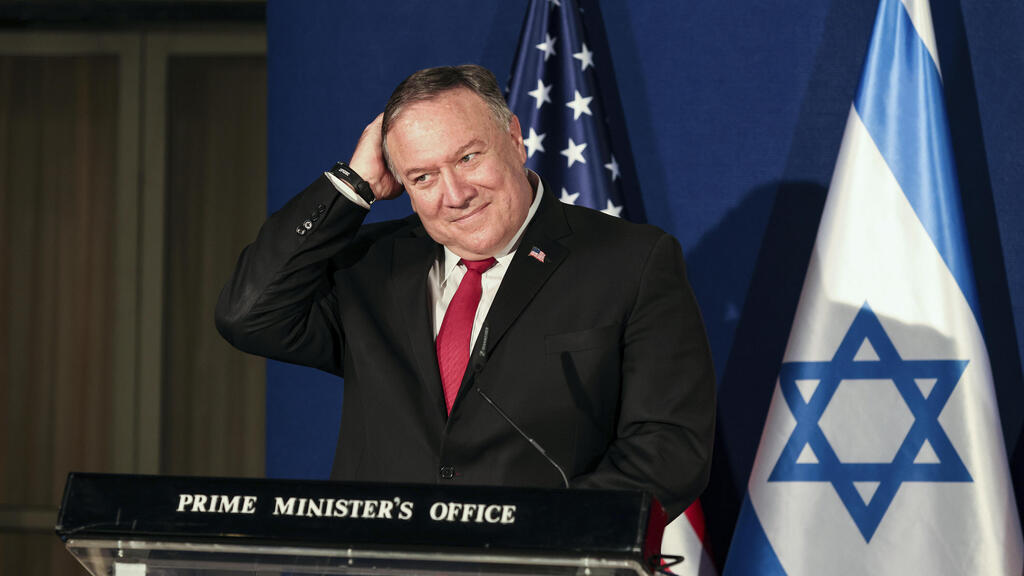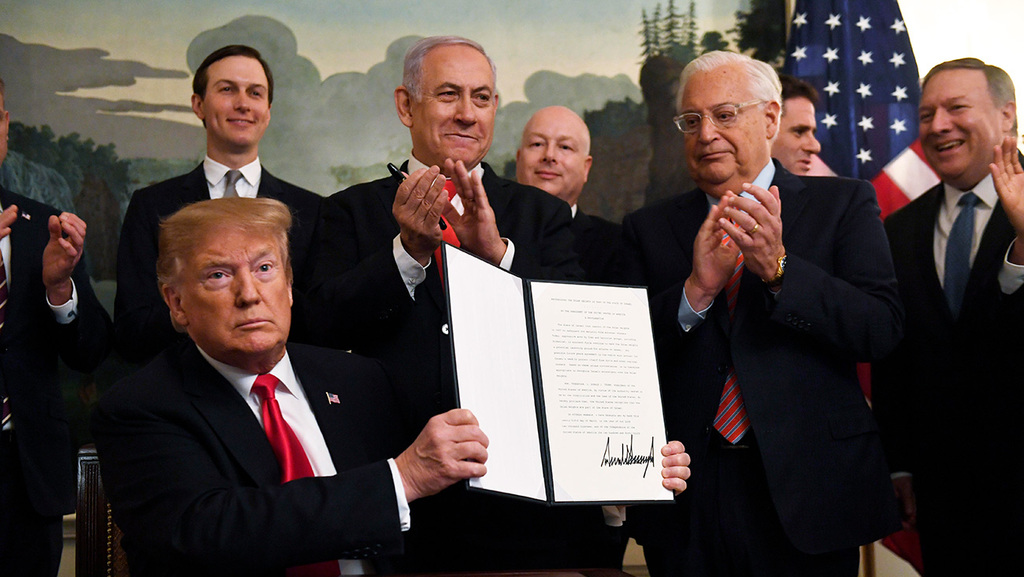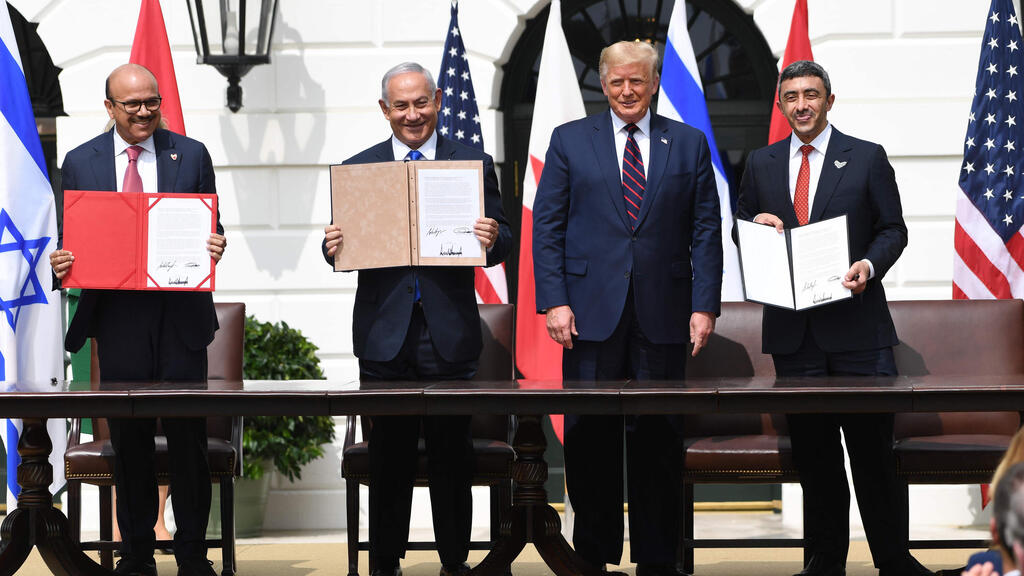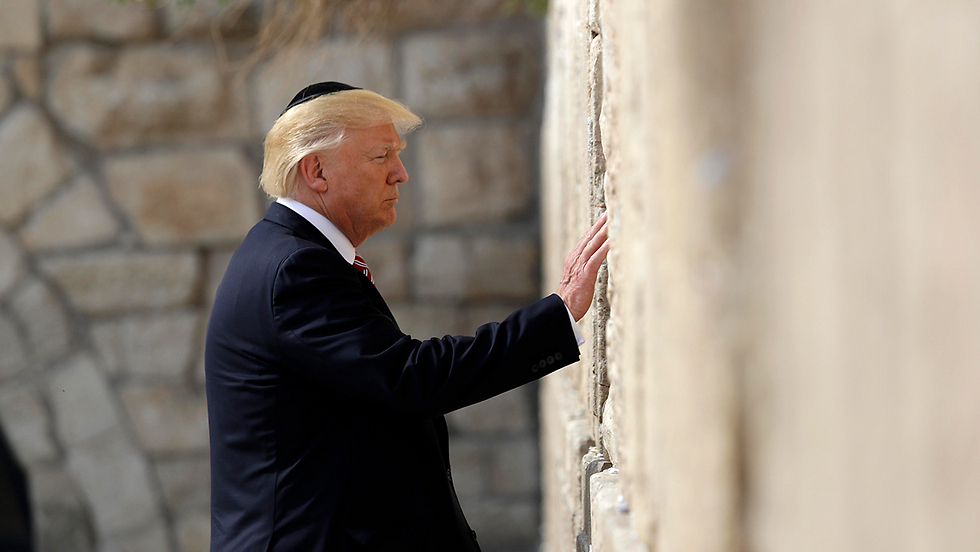Mike Pompeo is expected to become the first U.S. Secretary of State ever to visit land used by settlers in the West Bank on Thursday.
The expected visit to the Psagot winery would be another dramatic break by the Trump administration with the international community - which sees such settlement enterprises as illegal - and the traditional U.S. line on the Middle East conflict.
5 View gallery


U.S. Secretary of State Mike Pompeo smiles while patting his head during a press conference with Prime Minister Benjamin Netanyahu
(Photo: AP)
Coming in the dying weeks of Donald Trump's presidency, some would say Pompeo's move serves as further proof of his administration's pro-Israel stance.
Alleged occupation
Weeks after entering the White House, Trump says the U.S. no longer supports a two-state solution as he welcomes Prime Minister Benjamin Netanyahu to Washington on February 15, 2017 for the first of many visits.
In March his ambassador to the UN, Nikki Haley, says "the days of Israel-bashing at the UN are over".
Two months later Trump visits Israel and Bethlehem in the Palestinian Authority, becoming the first acting U.S. leader to pray before the Western Wall in the Old City.
In September, the U.S. ambassador to Israel causes an outcry by referring to the "alleged occupation" of the Palestinian territories.
Jerusalem 'Israel's capital'
Trump sets off a diplomatic earthquake on December 6 by unilaterally recognizing Jerusalem as the capital of Israel.
The move is roundly condemned by the international community. The Palestinians have long hoped to make east Jerusalem - occupied by Israel since the 1967 Six-Day War - the capital of their independent state.
On May 14, 2018 the U.S. says it is moving its embassy from Tel Aviv to Jerusalem
The same day at least 60 Palestinians are killed in clashes with the Israeli army during protests in Gaza, organized by Hamas that rules the coastal enclave, the bloodiest day there since the 2014 war.
Palestinian President Mahmoud Abbas says the Washington is no longer "fit" to be a honest broker in the Middle East.
Palestinian funds cut
5 View gallery


Palestinian and Hamas activists protesting in Nablus over the U.S. recognition of Jerusalem as the capital of Israel
The U.S. says it will no longer fund the UN Relief and Works Agency for Palestine Refugees (UNRWA) on August 31, a week after cutting $200 million (170 million euros) in aid to the Palestinians.
Ten days later it shuts the Palestinian mission in Washington, their de facto embassy.
Golan Heights
Trump recognizes the Israeli annexation of the Golan Heights, which it captured from Syria in 1967. He signs the decree alongside Netanyahu at the White House on March 25, 2019.
The move is condemned by the international community, which does not recognize the land grab, while Syria calls it a "blatant attack" on its sovereignty.
5 View gallery


Benjamin Netanyahu joins Trump administration officials at a signing ceremony to recognize Israel's sovereignty over the Golan Heights
(Photo: AP)
Settlements 'not illegal'
On November 18 the U.S. says it no longer regards Israeli settlements in the occupied West Bank illegal.
Trump peace plan
Standing alongside Netanyahu, Trump unveils his new Middle East plan at the White House on January 28, 2020.
It allows the Jewish state to potentially annex key parts of the West Bank, with Jerusalem remaining as Israel's "undivided" capital.
Arab states recognize Israel
5 View gallery


L-R: Bahrain FM Abdullatif al-Zayani, PM Benjamin Netanyahu, U.S. President Donald Trump, and Emirati FM Abdullah bin Zayed Al-Nahyan at the signing of the Abraham Accords at the White House
(Photo: AFP)
The United Arab Emirates and Bahrain normalize diplomatic relations with Israel amid great fanfare at the White House on September 15.
Abu Dhabi says the agreement would suspend the annexation of the West Bank but Netanyahu insists any suspension would be only temporary.
The Palestinians say they have been "stabbed in the back" by their old Arab states allies.
On October 23 Trump announces Sudan is also normalizing relations with Israel.


